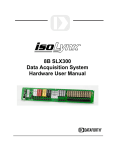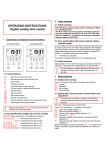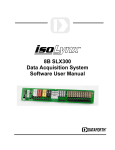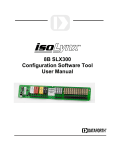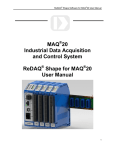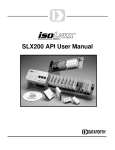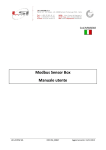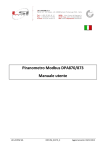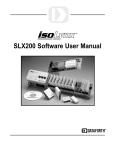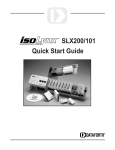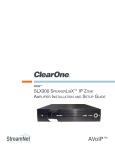Download 8B SLX300 LabVIEW VI Examples User Manual
Transcript
8B SLX300 LabVIEW VI Examples User Manual 8B isoLynx® SLX300 LabVIEW VI Examples User Manual ® 8B isoLynx SLX300 LabVIEW VI Examples User Manual MA1033 Rev. A – July 2010 © 2010 Dataforth Corporation. All Rights Reserved. The information in this manual has been checked carefully and is believed to be accurate; however, Dataforth assumes no responsibility for possible inaccuracies or omissions. Specifications are subject to change without notice. The information, tables, diagrams, and photographs contained herein are the property of Dataforth Corporation. No part of this manual may be reproduced or distributed by any means, electronic, mechanical, or otherwise, for any purpose other than the purchaser’s personal use, without the express written consent of Dataforth Corporation. isoLynx® is a registered trademark of Dataforth Corporation. National Instruments™ and LabVIEW™ are trademarks of National Instruments Corporation. Modbus® is a registered trademark of the Modbus Organization, Inc. ii 8B isoLynx® SLX300 LabVIEW VI Examples User Manual Table of Contents 1.0 Introduction........................................................................................................................................ 1 1.1 Overview ....................................................................................................................................... 1 1.2 Related Documents and Tools ...................................................................................................... 1 2.0 SLX300 Read Write Example ........................................................................................................... 3 2.1 Configuration ................................................................................................................................. 3 2.1.1 RTU/TCP Select ........................................................................................................................ 3 2.1.2 Slave ID ..................................................................................................................................... 3 2.1.3 TCP Open Parameters .............................................................................................................. 3 2.1.4 RTU Open Parameters .............................................................................................................. 4 2.2 Connect ......................................................................................................................................... 4 2.3 Read .............................................................................................................................................. 4 2.3.1 Read Modbus Start Address ..................................................................................................... 4 2.3.2 Read Quantity ............................................................................................................................ 4 2.3.3 Read Index and Data ................................................................................................................. 4 2.3.4 Read Data.................................................................................................................................. 4 2.4 Write .............................................................................................................................................. 4 2.4.1 Write Modbus Start Address...................................................................................................... 4 2.4.2 Write Quantity ............................................................................................................................ 5 2.4.3 Write Index and Data ................................................................................................................. 5 2.4.4 Write Data .................................................................................................................................. 5 2.5 3.0 Close ............................................................................................................................................. 5 SLX300 R_W Chart Example............................................................................................................ 6 3.1 Configuration ................................................................................................................................. 6 3.1.1 RTU/TCP Select ........................................................................................................................ 6 3.1.2 Slave ID ..................................................................................................................................... 6 3.1.3 TCP Open Parameters .............................................................................................................. 7 3.1.4 RTU Open Parameters .............................................................................................................. 7 3.2 Connect ......................................................................................................................................... 7 3.3 Read .............................................................................................................................................. 7 3.3.1 Read Modbus Start Address ..................................................................................................... 7 3.3.2 Quantity ..................................................................................................................................... 7 3.3.3 Interval ....................................................................................................................................... 7 3.3.4 Read Index and Data ................................................................................................................. 7 3.3.5 Read Data.................................................................................................................................. 7 3.4 Chart Recorder .............................................................................................................................. 8 3.4.1 Channel Select .......................................................................................................................... 8 3.4.2 Set X and Y Scales .................................................................................................................... 8 iii 8B isoLynx® SLX300 LabVIEW VI Examples User Manual 3.4.3 3.5 Write .............................................................................................................................................. 8 3.5.1 Write Modbus Start Address...................................................................................................... 8 3.5.2 Write Quantity ............................................................................................................................ 8 3.5.3 Write Index and Data ................................................................................................................. 8 3.5.4 Write Data .................................................................................................................................. 8 3.6 4.0 Close ............................................................................................................................................. 8 SLX300 2CH Scope Example ........................................................................................................... 9 4.1 Configuration ................................................................................................................................. 9 4.1.1 RTU/TCP Select ........................................................................................................................ 9 4.1.2 Slave ID ..................................................................................................................................... 9 4.1.3 TCP Open Parameters .............................................................................................................. 9 4.1.4 RTU Open Parameters ............................................................................................................ 10 4.1.5 Interval ..................................................................................................................................... 10 4.2 Connect ....................................................................................................................................... 10 4.3 Scope .......................................................................................................................................... 10 4.3.1 Run .......................................................................................................................................... 10 4.3.2 Set X and Y Scales .................................................................................................................. 10 4.3.3 View Data ................................................................................................................................ 10 4.4 5.0 Close ........................................................................................................................................... 10 SLX300 4CH Chart Recorder Example .......................................................................................... 11 5.1 Configuration ............................................................................................................................... 11 5.1.1 RTU/TCP Select ...................................................................................................................... 11 5.1.2 Slave ID ................................................................................................................................... 11 5.1.3 TCP Open Parameters ............................................................................................................ 11 5.1.4 RTU Open Parameters ............................................................................................................ 12 5.1.5 Interval ..................................................................................................................................... 12 5.2 Connect ....................................................................................................................................... 12 5.3 Start Continuous Scan Mode ...................................................................................................... 12 5.4 Chart Recorder ............................................................................................................................ 12 5.4.1 Run .......................................................................................................................................... 12 5.4.2 Select Channel ........................................................................................................................ 12 5.4.3 Set X and Y Scales .................................................................................................................. 12 5.4.4 View Data ................................................................................................................................ 12 5.5 6.0 Close ........................................................................................................................................... 12 SLX300 Frequency Counter / Generator Example ......................................................................... 13 6.1 iv View Data .................................................................................................................................. 8 Configuration ............................................................................................................................... 13 6.1.1 RTU/TCP Select ...................................................................................................................... 13 6.1.2 Slave ID ................................................................................................................................... 13 8B isoLynx® SLX300 LabVIEW VI Examples User Manual 6.1.3 TCP Open Parameters ............................................................................................................ 13 6.1.4 RTU Open Parameters ............................................................................................................ 14 6.2 Connect ....................................................................................................................................... 14 6.3 Frequency Generator .................................................................................................................. 14 6.3.1 Set Frequency ......................................................................................................................... 14 6.3.2 Set Arm / Disarm Generator Register ..................................................................................... 14 6.3.3 Start Generator ........................................................................................................................ 14 6.4 Pulse and Frequency Counter .................................................................................................... 14 6.4.1 Set Input Polarity ..................................................................................................................... 14 6.4.2 Set Arm / Disarm Counter Register ......................................................................................... 14 6.4.3 Set Counter.............................................................................................................................. 15 6.4.4 Read Counter .......................................................................................................................... 15 6.5 Close ........................................................................................................................................... 15 v 8B isoLynx® SLX300 LabVIEW VI Examples User Manual About Dataforth Corporation “Our passion at Dataforth Corporation is designing, manufacturing, and marketing the best possible signal conditioning, data acquisition, and data communication products. Our mission is to set new standards of product quality, performance, and customer service.” Dataforth Corporation, with more than a quarter century of experience, is the worldwide leader in Instrument Class® Industrial Electronics – rugged, high performance signal conditioning, data acquisition, and data communication products that play a vital role in maintaining the integrity of industrial automation, data acquisition, and quality assurance systems. Our products directly connect to most industrial sensors and protect valuable measurement and control signals and equipment from the dangerous and degrading effects of noise, transient power surges, internal ground loops, and other hazards present in industrial environments. Dataforth spans the globe with more than 50 International Distributors and US Representative Companies. Our customers benefit from a team of over 130 sales people highly trained in the application of precision products for industrial markets. In addition, we have a team of application engineers in our Tucson factory ready to solve any in-depth application questions. Upon receipt of a quote or order, our Customer Service Department provides fast one-day delivery information turnaround. We maintain an ample inventory that allows small quantity orders to be shipped from stock. Contacting Dataforth Corporation Contact Method E-Mail: Technical Support Website: Phone: Fax: Mail: Contact Information [email protected] www.dataforth.com 520-741-1404 and toll free 800-444-7644 520-741-0762 Dataforth Corporation 3331 E. Hemisphere Loop Tucson, AZ 85706 Errata Sheets Refer to the Technical Support area of Dataforth’s website (www.dataforth.com) for any errata information on this product. vi 8B isoLynx® SLX300 LabVIEW VI Examples User Manual 1.0 Introduction 1.1 Overview The 8B isoLynx® SLX300 system is shipped with five LabVIEW VI examples, which demonstrate how to run the 8B isoLynx® SLX300 with LabVIEW. These will enable users to develop LabVIEW VI applications. The five examples are: • SLX300 Read Write Example: Demonstrates how to read and write data and other information from and to the SLX300 using Modbus commands. • SLX300 R_W Chart Example: Demonstrates how to read and write data and other information from and to the SLX300 using Modbus commands and also provides a onechannel chart recorder to graphically display the data. • SLX300 2CH Scope Example: Demonstrates how to use the Buffer Scan mode to acquire data and present it on a 2-channel oscilloscope display. • SLX300 4CH Chart Example: Demonstrates how to use the Continuous Scan mode to acquire data and present it on a 4-channel chart recorder display. • SLX300 Frequency Counter / Generator Example: Demonstrates how to use the frequency counter and frequency generator special functions. These can use either the FieldTalk Modbus protocol drivers and DLL library or the National Instruments Modbus VI. Both are included on the SLX370 Software Tools CD. 1.2 Related Documents and Tools The following documents are available from Dataforth Corporation: • MA1029 SLX300 Configuration Software Tool User Manual • MA1030 SLX300 Quick Start Guide • MA1031 SLX300 Hardware User Manual • MA1032 SLX300 Software User Manual The following documents are available from the Modbus Organization (www.modbus.org): • Modbus Application Protocol Specification, V1.1a, June 2004 • Modbus over Serial Line Specification & Implementation Guide, V1.0, November 2004 • Modbus Messaging on TCP/IP Implementation Guide, V1.0a, June 2004 The following tools and documents are available from FieldTalk* (www.modbusdriver.com): • Modbus Protocol Drivers and DLL Libraries • *If the FieldTalk tools are used, the dynamic link library, libmbusmaster.dll, must be either in the same folder as the VI being executed or in the current environment path. FieldTalk User Manual 1 8B isoLynx® SLX300 LabVIEW VI Examples User Manual The following Tools and documents are available from National Instruments (www.ni.com): 2 • Free Modbus Protocol Drivers VI and Examples • LabVIEW User Manual 8B isoLynx® SLX300 LabVIEW VI Examples User Manual 2.0 SLX300 Read Write Example 2.1 Configuration Before reading and writing data or other information from and to the 8B isoLynx® SLX300, basic configuration of the system must be performed. The following steps illustrate how to use the SLX300 read / write example. 2.1.1 RTU/TCP Select The SLX300 system supports Modbus RTU over an RS-232 serial port, RS-485 serial port or USB port. It also supports Modbus TCP over Ethernet. The default protocol setting is TCP. Select RTU or TCP protocol for the port being used. 2.1.2 Slave ID Select the Slave ID that matches the address set with jumpers on the system. The system is shipped with default Slave ID of 16. The valid range of Slave IDs is 16 - 31. 2.1.3 TCP Open Parameters The TCP open parameters must be input once the Modbus TCP protocol has been selected. Enter the IP address into the IP Address box. The default IP address is 192.168.128.100. 3 8B isoLynx® SLX300 LabVIEW VI Examples User Manual 2.1.4 RTU Open Parameters The RTU open parameters are entered after the Modbus RTU protocol has been selected. There are three variable parameters: 2.2 • Port name: COM1-COM10. The default setting is COM3. • Baud Rate: The valid baud rates are 2400, 4800, 9600, 19200, 38400, 57600, 115200, 230400, 460800 and 921600. The default setting is 115200. • Parity: Even, Odd, None. The default setting is Even. Connect After configuration, click the Connect button to connect the software to the 8B isoLynx® SLX300. 2.3 Read The following steps describe how to read data from the 8B isoLynx® SLX300. Refer to the 8B isoLynx® SLX300 Software User Manual, Appendix A, for the Modbus Address Map. 2.3.1 Read Modbus Start Address Enter the start address in the Modbus start address box. 2.3.2 Read Quantity Enter the quantity of data to read in the Quantity box. 2.3.3 Read Index and Data The Index and Data display boxes are used to view the data. 2.3.4 Read Data To read data, click the Read button. The text on the Read button will change to ‘Stop’ and the Data display boxes will show the data read from the system. To stop reading data, click the Stop button. Example 1: Read 12-channel analog data from the Continuous Scan mode. Set Modbus start address = 0, quantity = 12, then click the Read button. Example 2: Read temperature register. Set Modbus start address = 5633, quantity = 1, then click the Read button. 2.4 Write The following steps describe how to write data to the 8B isoLynx® SLX300. Refer to the 8B isoLynx® SLX300 Software User Manual, Appendix A, for the Modbus Address Map. 2.4.1 Write Modbus Start Address Enter the start address in the Modbus start address box. 4 8B isoLynx® SLX300 LabVIEW VI Examples User Manual 2.4.2 Write Quantity Enter the quantity of data to be written in the Quantity box. 2.4.3 Write Index and Data Enter the data to be written in the Write Data boxes. 2.4.4 Write Data To write data, click the Write button. Example 1: Write the Continuous Scan mode command to the SLX300 system. Set Modbus start address = 4612, quantity = 1, data0 = 1, then click the Write button. Example 2: Set Digital I/O channel states. Set channel 0 to output and channel 1 to input. Set Modbus start address = 32810, quantity = 2, data0 = 2, data1 = 1, then click the Write button. Example 3: Set Digital I/O channel value. Set channel 0 output value to 1. Set Modbus start address = 32800, quantity = 1, data0 = 1, then click the Write button. 2.5 Close To close the SLX300 Read Write Example, click the Close button. 5 8B isoLynx® SLX300 LabVIEW VI Examples User Manual 3.0 SLX300 R_W Chart Example 3.1 Configuration Before reading and writing data or other information from and to the 8B isoLynx® SLX300, basic configuration of the system must be performed. The following steps illustrate how to use the SLX300 read and write chart example. 3.1.1 RTU/TCP Select The SLX300 system supports Modbus RTU over an RS-232 serial port, RS-485 serial port or USB port. It also supports Modbus TCP over Ethernet. The default protocol setting is TCP. Select RTU or TCP protocol for the port being used. 3.1.2 Slave ID Select the Slave ID that matches the address set with jumpers on the system. The system is shipped with default Slave ID of 16. The valid range of Slave IDs is 16 - 31. 6 8B isoLynx® SLX300 LabVIEW VI Examples User Manual 3.1.3 TCP Open Parameters The TCP open parameters must be input once the Modbus TCP protocol has been selected. Enter the IP address into the IP Address box. The default IP address is 192.168.128.100. 3.1.4 RTU Open Parameters The RTU open parameters are entered after the Modbus RTU protocol has been selected. There are three variable parameters: 3.2 • Port name: COM1-COM10. The default setting is COM3. • Baud Rate: The valid baud rates are 2400, 4800, 9600, 19200, 38400, 57600, 115200, 230400, 460800 and 921600. The default setting is 115200. • Parity: Even, Odd, None. The default setting is Even. Connect After configuration, click the Connect button to connect the software to the 8B isoLynx® SLX300. 3.3 Read The following steps describe how to read data from the 8B isoLynx® SLX300. Refer to the 8B isoLynx® SLX300 Software User Manual, Appendix A, for the Modbus Address Map. 3.3.1 Read Modbus Start Address Enter the start address in the Modbus start address box. 3.3.2 Quantity Enter the quantity of data to read in the Quantity box. 3.3.3 Interval The interval is specified in milliseconds and sets the time between consecutive scans of the 12 analog input channels when the system is operated in Continuous Scan mode. The default interval setting is 100ms. 3.3.4 Read Index and Data The Index and Data display boxes are used to view the data. 3.3.5 Read Data To read data, click the Read button. The text on the Read button will change to ‘Stop’ and the Data display boxes will show the data read from the system. To stop reading data, click the Stop button. Example 1: Read 12-channel analog data from the Continuous Scan mode. Set Modbus start address = 0, quantity = 12, then click the Read button. Example 2: Read temperature register. Set Modbus start address = 5633, quantity = 1, then click the Read button. 7 8B isoLynx® SLX300 LabVIEW VI Examples User Manual 3.4 Chart Recorder The following steps describe how to use the chart recorder. 3.4.1 Channel Select Select the channel to display on the chart recorder in the Channel box. 3.4.2 Set X and Y Scales To change the X and Y scales, click the scale text and enter the desired value. 3.4.3 View Data The chart recorder will start to record data after the Read button is clicked to initiate communication with the system. Review the data using the built-in tools. 3.5 Write The following steps describe how to write data to the 8B isoLynx® SLX300. Refer to the 8B isoLynx® SLX300 Software User Manual, Appendix A, for the Modbus Address Map. 3.5.1 Write Modbus Start Address Enter the start address in the Modbus start address box. 3.5.2 Write Quantity Enter the quantity of data to be written in the Quantity box. 3.5.3 Write Index and Data Enter the data to be written in the Write Data boxes. 3.5.4 Write Data To write data, click the Write button. Example 1: Write the Continuous Scan mode command to the SLX300 system. Set Modbus start address = 4612, quantity = 1, data0 = 1, then click the Write button. Example 2: Set Digital I/O channel states. Set channel 0 to output and channel 1 to input. Set Modbus start address = 32810, quantity = 2, data0 = 2, data1 = 1, then click the Write button. Example 3: Set Digital I/O channel value. Set channel 0 output value to 1. Set Modbus start address = 32800, quantity = 1, data0 = 1, then click the Write button. 3.6 Close To close the SLX300 R_W Chart Example, click the Close button. 8 8B isoLynx® SLX300 LabVIEW VI Examples User Manual 4.0 SLX300 2CH Scope Example 4.1 Configuration Before running the 2-channel scope example, basic configuration of the system must be performed. The following steps illustrate how to use the SLX300 2-channel scope example. 4.1.1 RTU/TCP Select The SLX300 system supports Modbus RTU over an RS-232 serial port, RS-485 serial port or USB port. It also supports Modbus TCP over Ethernet. The default protocol setting is TCP. Select RTU or TCP protocol for the port being used. 4.1.2 Slave ID Select the Slave ID that matches the address set with jumpers on the system. The system is shipped with default Slave ID of 16. The valid range of Slave IDs is 16 - 31. 4.1.3 TCP Open Parameters The TCP open parameters must be input once the Modbus TCP protocol has been selected. Enter the IP address into the IP Address box. The default IP address is 192.168.128.100. 9 8B isoLynx® SLX300 LabVIEW VI Examples User Manual 4.1.4 RTU Open Parameters The RTU open parameters are entered after the Modbus RTU protocol has been selected. There are three variable parameters: 4.1.5 • Port name: COM1-COM10. The default setting is COM3. • Baud Rate: The valid baud rates are 2400, 4800, 9600, 19200, 38400, 57600, 115200, 230400, 460800 and 921600. The default setting is 115200. • Parity: Even, Odd, None. The default setting is Even. Interval The interval determines the sample rate when the system is operated in Burst Scan mode. The sample rate is calculated by: Sample rate = 41780000 / Interval The maximum sample rate is 100kS/second and the default interval setting is 2088 = 20kS/second. 4.2 Connect After configuration, click the Connect button to connect the software to the 8B isoLynx® SLX300. 4.3 Scope The following steps describe how to use the oscilloscope. 4.3.1 Run Click the Run and Stop buttons to operate the scope. 4.3.2 Set X and Y Scales To change the X and Y scales, click the scale text and enter the desired values. 4.3.3 View Data The system will scan analog channels 0 and 1 and plot the data on the oscilloscope display after the Run button is clicked. The current readings will be displayed in the Data display boxes. Review the data using the built-in tools. 4.4 Close To close the SLX300 2CH Scope Example, click the Close button. 10 8B isoLynx® SLX300 LabVIEW VI Examples User Manual 5.0 SLX300 4CH Chart Recorder Example 5.1 Configuration Before running this 4-channel chart recorder example, basic configuration of the system must be performed. The following steps illustrate how to use the SLX300 4-channel chart recorder example. 5.1.1 RTU/TCP Select The SLX300 system supports Modbus RTU over an RS-232 serial port, RS-485 serial port or USB port. It also supports Modbus TCP over Ethernet. The default protocol setting is TCP. Select RTU or TCP protocol for the port being used. 5.1.2 Slave ID Select the Slave ID that matches the address set with jumpers on the system. The system is shipped with default Slave ID of 16. The valid range of Slave IDs is 16 - 31. 5.1.3 TCP Open Parameters The TCP open parameters must be input once the Modbus TCP protocol has been selected. Enter the IP address into the IP Address box. The default IP address is 192.168.128.100. 11 8B isoLynx® SLX300 LabVIEW VI Examples User Manual 5.1.4 RTU Open Parameters The RTU open parameters are entered after the Modbus RTU protocol has been selected. There are three variable parameters: 5.1.5 • Port name: COM1-COM10. The default setting is COM3. • Baud Rate: The valid baud rates are 2400, 4800, 9600, 19200, 38400, 57600, 115200, 230400, 460800 and 921600. The default setting is 115200. • Parity: Even, Odd, None. The default setting is Even. Interval The interval is specified in milliseconds and sets the time between consecutive scans of the 12 analog input channels when the system is operated in Continuous Scan mode. The default interval setting is 100ms. 5.2 Connect After configuration, click the Connect button to connect the software to the 8B isoLynx® SLX300. 5.3 Start Continuous Scan Mode Start Continuous Scan mode by clicking the Start button. 5.4 Chart Recorder The following steps describe how to use the 4-channel chart recorder. 5.4.1 Run Click the Run and Stop buttons to operate the chart recorder. 5.4.2 Select Channel Use the Select Channel button to choose one of the 12 analog input channels to display on the chart recorder. Repeat for up to three more channels. 5.4.3 Set X and Y Scales To change the X and Y scales, click the scale text and enter the desired values. 5.4.4 View Data The system will scan analog input channels 0 through 11 and plot the data on the chart recorder display after the Run button is clicked. The current readings will be displayed in the 12 CH Data Display boxes. Review the data using the built-in tools. 5.5 Close To close the SLX300 4CH Chart Recorder Example, click the Close button. 12 8B isoLynx® SLX300 LabVIEW VI Examples User Manual 6.0 SLX300 Frequency Counter / Generator Example 6.1 Configuration Before running the frequency counter and frequency generator example, basic configuration of the system must be performed. The following steps illustrate how to use the SLX300 frequency counter/ generator example. 6.1.1 RTU/TCP Select The SLX300 system supports Modbus RTU over an RS-232 serial port, RS-485 serial port or USB port. It also supports Modbus TCP over Ethernet. The default protocol setting is TCP. Select RTU or TCP protocol for the port being used. 6.1.2 Slave ID Select the Slave ID that matches the address set with jumpers on the system. The system is shipped with default Slave ID of 16. The valid range of Slave IDs is 16 - 31. 6.1.3 TCP Open Parameters The TCP open parameters must be input once the Modbus TCP protocol has been selected. Enter the IP address into the IP Address box. The default IP address is 192.168.128.100. 13 8B isoLynx® SLX300 LabVIEW VI Examples User Manual 6.1.4 RTU Open Parameters The RTU open parameters are entered after the Modbus RTU protocol has been selected. There are three variable parameters: 6.2 • Port name: COM1-COM10. The default setting is COM3. • Baud Rate: The valid baud rates are 2400, 4800, 9600, 19200, 38400, 57600, 115200, 230400, 460800 and 921600. The default setting is 115200. • Parity: Even, Odd, None. The default setting is Even. Connect After configuration, click the Connect button to connect the software to the 8B isoLynx® SLX300. 6.3 Frequency Generator The following steps describe how to use the frequency generator. 6.3.1 Set Frequency Input the desired frequency in Hz using both the lower and upper Frequency register boxes. Data values for each box are 0 to 65536. The desired frequency is represented by the value in the lower register box plus the value in the upper register box multiplied by 65536. Total frequency = value in lower box + (value in upper box * 65536) Hz. The default setting is 100Hz. The upper limit when using an SCMD isolated module is 11kHz. The upper limit when using the non-isolated SCMD-PT is 100kHz. 6.3.2 Set Arm / Disarm Generator Register Set the Arm / Disarm Generator register. 1 = Arm the generator and 0 = Disarm the generator. 6.3.3 Start Generator Click the Set Generator button to start the generator. Digital I/O Channel 2 will output the frequency if armed. 6.4 Pulse and Frequency Counter The following steps describe how to use the pulse and frequency counter. 6.4.1 Set Input Polarity Set the input polarity in the Input Polarity box. 0 = positive (rising) and 1 = negative (falling). 6.4.2 Set Arm / Disarm Counter Register Set the Arm / Disarm Counter register. 1 = Arm the counter and 0 = Disarm the counter. 14 8B isoLynx® SLX300 LabVIEW VI Examples User Manual 6.4.3 Set Counter Connect the signal to be counted to Digital I/O Channel 4. Click the Set Counter button then start the counter. 6.4.4 Read Counter Click the Read Counter button. The pulse and frequency counts will be displayed in the Pulse / Frequency display boxes. 6.5 Close To close the SLX300 Frequency Counter / Generator Example, click the Close button. 15 8B isoLynx® SLX300 LabVIEW VI Examples User Manual DATAFORTH WARRANTY Applying to Products Sold by Dataforth Corporation a. General. Dataforth Corporation (“Dataforth”) warrants that its products furnished under this Agreement will, at the time of delivery, be free from defects in material and workmanship and will conform to Dataforth's applicable specifications or, if appropriate, to buyer's specifications accepted in writing by Dataforth. DATAFORTH'S OBLIGATION OR LIABILITY TO BUYER FOR PRODUCTS WHICH DO NOT CONFORM TO THE ABOVE STATED WARRANTY SHALL BE LIMITED TO DATAFORTH, AT DATAFORTH'S SOLE DISCRETION, EITHER REPAIRING, REPLACING, OR REFUNDING THE PURCHASE PRICE OF THE DEFECTIVE PRODUCT(S) PROVIDED THAT WRITTEN NOTICE OF SAID DEFECT IS RECEIVED BY DATAFORTH WITHIN THE TIME PERIODS SET FORTH BELOW: i. for all software products including licensed programs, thirty (30) days from date of initial delivery; government, or governmental agency of any country resulting directly or indirectly (i) from any acts not authorized by Dataforth in writing or any statements regarding the products inconsistent with Dataforth's product documentation or standard warranty, or (ii) from any breach or threatened breach by buyer, or by any of its employees or agents, of any term, condition or provision of this Warranty or (iii) from any warranty, representation, covenant or obligation given by buyer to any third party and not expressly provided for in this Warranty or (iv) for any non-compliance (in any form) of the products with any necessary or mandatory applicable laws, regulations, procedures, government or industry policies or requirements related to the use, sale or importation of the products. Such indemnification shall include the payment of all reasonable attorneys' fees and other costs incurred by Dataforth in defending such claim. c. ii. for all hardware products including complete systems, one (1) year from date of initial delivery; iii. for all special products, sixty (60) days from date of initial delivery; and further, all products warranted hereunder for which Dataforth has received timely notice of nonconformance must be returned FOB to Dataforth's plant in Tucson, Arizona USA within thirty (30) days after the expiration of the warranty periods set forth above. The foregoing warranties shall not apply to any products which Dataforth determines have, by buyer or otherwise, been subjected to operating and/or environmental conditions in excess of the maximum value established therefor in the applicable specifications, or any products that have been the subject of mishandling, misuse, misapplication, neglect, improper testing, repair, alteration or damage. THE PROVISIONS OF THE FOREGOING WARRANTIES EXTEND TO BUYER ONLY AND NOT TO BUYER'S CUSTOMERS OR USERS OF BUYER'S PRODUCTS. THE DATAFORTH STANDARD WARRANTY IS IN LIEU OF ALL WARRANTIES OF MERCHANTABILITY AND FITNESS FOR A PARTICULAR PURPOSE OR USE AND ALL OTHER WARRANTIES WHETHER EXPRESS, IMPLIED OR STATUTORY, EXCEPT AS TO TITLE. THE DATAFORTH STANDARD WARRANTY MAY BE CHANGED BY DATAFORTH WITHOUT NOTICE. b. Buyer Indemnity. Buyer agrees to indemnify and hold Dataforth harmless from and against any and all claims, damages and liabilities whatsoever asserted by any person, entity, industry organization, 16 Limitation on Damages. (1) IN NO EVENT SHALL DATAFORTH, ITS SUPPLIERS, LICENSORS, SERVICE PROVIDERS, EMPLOYEES, AGENTS, OFFICERS, AND DIRECTORS BE LIABLE FOR INDIRECT, SPECIAL, INCIDENTAL, COVER, ECONOMIC, PUNITIVE, ACTUAL, EXEMPLARY, CONSEQUENTIAL OR OTHER DAMAGES OF ANY NATURE INCLUDING, WITHOUT LIMITATION, LOST PROFITS OR REVENUES, COSTS OF REPLACEMENT PRODUCTS, LOSS OR DAMAGE TO DATA ARISING OUT OF THE USE OR INABILITY TO USE ANY DATAFORTH PRODUCT. (2) IN NO EVENT SHALL DATAFORTH BE LIABLE FOR DIRECT, SPECIAL, INDIRECT, INCIDENTAL OR CONSEQUENTIAL DAMAGES OF ANY NATURE RESULTING FROM BUYER’S NONCOMPLIANCE (IN ANY FORM) WITH ALL NECESSARY OR MANDATORY APPLICABLE LAWS, REGULATIONS, PROCEDURES, GOVERNMENT POLICIES OR REQUIREMENTS RELATED TO THE USE, SALE OR IMPORTATION OF PRODUCTS. (3) IN NO EVENT WILL THE COLLECTIVE LIABILITY OF DATAFORTH AND ITS SUPPLIERS, LICENSORS, SERVICE PROVIDERS, EMPLOYEES, AGENTS, OFFICERS, AND DIRECTORS TO ANY PARTY (REGARDLESS OF THE FORM OF ACTION, WHETHER BASED UPON WARRANTY, CONTRACT, TORT, OR OTHERWISE) EXCEED THE GREATER OF EITHER US$1000.00 (ONE THOUSAND DOLLARS U.S.A. CURRENCY) OR THE AMOUNT PAID TO DATAFORTH FOR THE APPLICABLE PRODUCT OR SERVICE OUT OF WHICH LIABILITY AROSE. 8B isoLynx® SLX300 LabVIEW VI Examples User Manual (4) DATAFORTH’S LIABILITY ARISING OUT OF THE PRODUCTION, SALE OR SUPPLY OF PRODUCTS OR THEIR USE OR DISPOSITION, WHETHER BASED UPON WARRANTY, CONTRACT, TORT OR OTHERWISE, SHALL NOT EXCEED THE GREATER OF EITHER US$1000.00 (ONE THOUSAND DOLLARS U.S.A. CURRENCY) OR THE ACTUAL PURCHASE PRICE PAID BY BUYER FOR DATAFORTH'S PRODUCTS. DATAFORTH'S LIABILITY FOR ANY CLAIM OF ANY KIND SHALL IN NO CASE EXCEED THE OBLIGATION OR LIABILITY SPECIFIED IN THIS WARRANTY. d. Technical Assistance. Dataforth 's Warranty as hereinabove set forth shall not be enlarged, diminished or affected by, and no obligation or liability shall arise or grow out of, Dataforth's rendering of technical advice, facilities or service in connection with buyer's order of the products furnished hereunder. e. Warranty Procedures. Buyer shall notify Dataforth of any products which it believes to be defective during the applicable warranty period and which are covered by the Warranty set forth above. Buyer shall not return any products for any reason without the prior authorization of Dataforth and issuance of a Return Material Authorization ("RMA") number. After issuance of a RMA number, such products shall be promptly returned by buyer (and in no event later than thirty (30) days after the Warranty expiration date), transportation and insurance prepaid, to Dataforth's designated facility for examination and testing. Dataforth shall either repair or replace any such products found to be so defective and promptly return such products to buyer, transportation and insurance prepaid. Should Dataforth's examination and testing not disclose any defect covered by the foregoing Warranty, Dataforth shall so advise buyer and dispose of or return the products in accordance with buyer's instructions and at buyer's sole expense, and buyer shall reimburse Dataforth for testing expenses incurred at Dataforth's then current repair rates. f. Repair Warranty. Dataforth warrants its repair work and/or replacement parts for a period of ninety (90) days from receipt by buyer of the repaired or replaced products or for the remainder of the warranty period for the initial delivery of such order as set forth in paragraph a above, whichever is greater. g. Critical Applications. Certain applications using Dataforth's products may involve potential risks of death, personal injury, or severe property or environmental damage ("Critical Applications"). DATAFORTH'S PRODUCTS ARE NOT DESIGNED, INTENDED, AUTHORIZED, OR WARRANTED TO BE SUITABLE FOR USE IN LIFE-SUPPORT DEVICES OR SYSTEMS, SAFETY EQUIPMENT, NUCLEAR FACILITY APPLICATIONS OR OTHER CRITICAL APPLICATIONS WHERE MALFUNCTION OF THE PRODUCT CAN BE EXPECTED TO RESULT IN PERSONAL INJURY, DEATH OR SEVERE PROPERTY DAMAGE. BUYER USES OR SELLS SUCH PRODUCTS FOR USE IN SUCH CRITICAL APPLICATIONS AT BUYER'S OWN RISK AND AGREES TO DEFEND, INDEMNIFY AND HOLD HARMLESS DATAFORTH FROM ANY AND ALL DAMAGES, CLAIMS, PROCEEDINGS, SUITS OR EXPENSE RESULTING FROM SUCH USE. h. Static Sensitive. Dataforth ships all product in anti-static packages. Dataforth's Warranty as hereinabove set forth shall not cover warranty repair, replacement, or refund on product or devices damaged by static due to buyer's failure to properly ground. _____________________________________________________________________________________________ Application Support Dataforth provides timely, high-quality product support. Call 1-800-444-7644 TOLL-FREE. Returns/Repair Policy All warranty and repair requests should be directed to the Dataforth Customer Service Department at (520) 741-1404. If a product return is required, request a Return Material Authorization (RMA) number. You should be ready to provide the following information: 1. 2. 3. 4. 5. Complete product model number. Product serial number. Name, address, and telephone number of person returning product. Special repair instructions. Purchase order number for out-of-warranty repairs. 17 8B isoLynx® SLX300 LabVIEW VI Examples User Manual The product should be carefully packaged, making sure the RMA number appears on the outside of the package, and ship prepaid to: Dataforth Corporation 3331 E. Hemisphere Loop Tucson, AZ 85706 USA The information provided herein is believed to be reliable; however, DATAFORTH assumes no responsibility for inaccuracies or omissions. DATAFORTH assumes no responsibility for the use of this information, and all use of such information shall be entirely at the user's own risk. Application information is intended as suggestions for possible use of the products and not as explicit performance in a specific application. Prices and specifications are subject to change without notice. No patent rights or licenses to any of the circuits described herein are implied or granted to any third party. DATAFORTH does not authorize or warrant any DATAFORTH product for use in life support devices and/or systems. 18 8B isoLynx® SLX300 LabVIEW VI Examples User Manual 19 8B isoLynx® SLX300 LabVIEW VI Examples User Manual ® 8B isoLynx SLX300 LabVIEW VI Examples User Manual MA1033 Rev. A – July 2010 © 2010 Dataforth Corporation. All Rights Reserved.



























